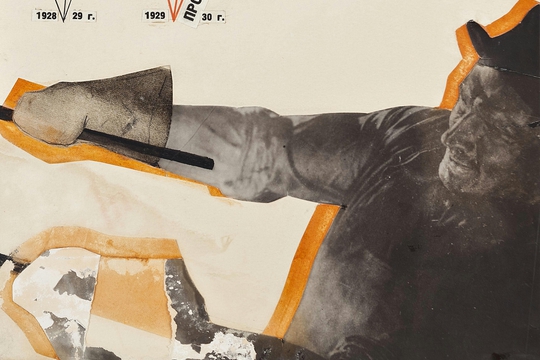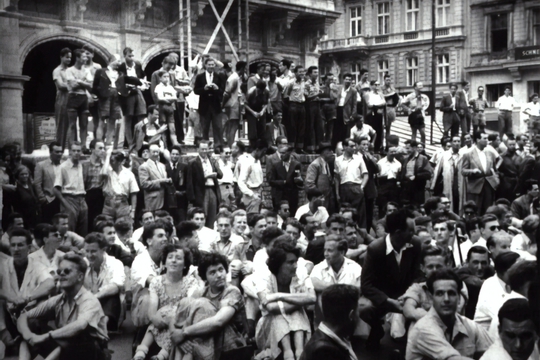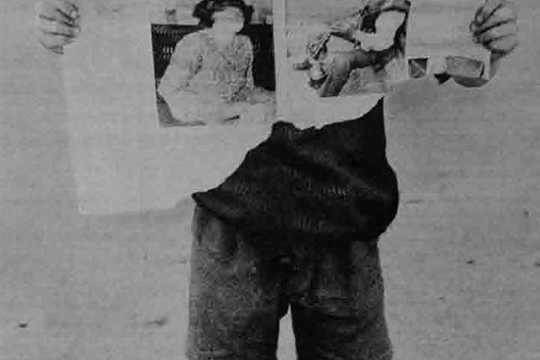Andrew Rothstein, Communist Party of Great Britain - A Workers’ Enquiry by Karl Marx (1933)

theory
Andrew Rothstein, Communist Party of Great Britain - A Workers’ Enquiry by Karl Marx (1933)
by
Andrew Rothstein
/
July 9, 2022
in
Karl Marx's Workers Inquiry
(#14)
Chapter Eleven
Andrew Rothstein provided this foreword to the first English edition of Marx’s inquiry, published by the CPGB in London in 1933. An introduction from the Soviet Marx-Engels-Lenin Institute included in the pamphlet has also been reproduced below.
Foreword
It is very appropriate that this little masterpiece by Marx should be discovered on the eve of the fiftieth anniversary of his death. For, after all the countless volumes and pamphlets which have been devoted to “exploding” Marx, millions upon millions of workers in Great Britain and other countries are now “discovering” him for the first time. The deepening world economic crisis is rushing the capitalist world towards new wars and new revolutionary struggles. Seventy-five years after the “Communist Manifesto” first appeared from Marx’s pen, and just as if the learned professors, politicians, economists and other capitalist propagandists had never existed, tens of millions of people are learning by bitter experience the truth of Marx’s description of crises:
“The productive forces at the disposal of society no longer tend to further the development of the conditions of bourgeois property; on the contrary, they have become too powerful for these conditions, by which they are fettered, and so soon as they overcome these fetters, they bring disorder into the whole of bourgeois society, endanger the existence of bourgeois property. The conditions of bourgeois society are too narrow to comprise the wealth created by them. And how does the bourgeoisie get over the crises? On the one hand by enforced destruction of a mass of productive forces; on the other, by the conquest of new markets, and by the more thorough exploitation of the old ones. That is to say, by paving the way for more extensive and more destructive crises, and by diminishing the means whereby crises are prevented.”
Don’t the words of the “exploded” and “obsolete” Marx fit the capitalist world to-day like a glove? Of course they do – just as the successful laying of the foundations of Socialism by the Soviet Union during the first Five Year Plan, and the beginning of the struggle to achieve a classless society as a result of the second, are justifying every word of the brilliant statement later on in the “Manifesto”:
“If the proletariat during its contest with the bourgeoisie is compelled, by the force of circumstances, to organise itself as a class; if, by means of a revolution, it makes itself the ruling class, and as such sweeps away by force the old conditions of production; then it will, along with these conditions have swept away the conditions for the existence of class antagonisms, and of classes generally, and will thereby have abolished its own supremacy as a class. In place of the old bourgeois society, with its classes and class antagonisms, we shall have an association, in which the free development of each is the condition for the free development of all.”
But Marx was not only a student and a theorist of immense genius. Many of his opponents have attempted to relegate him to the sphere of armchair philosophers. Nothing could be more false or ridiculous. Marx was a practical everyday fighter for the working class – from the time of his revolutionary activity in 1847 and 1848, onwards through the long years of life in England, when his mail was crammed every day with letters from Socialists and working men all over the world, asking for his advice and guidance. These he gave with inexhaustible energy and clarity on all subjects – the most humdrum questions of bread and butter, trade union tactics and so forth, to the most abstruse problems of economic and philosophical theory.
The Workers’ Enquiry is a magnificent example of Marx’s work.
It shows him, first, as a practical fighter, busying himself with the everyday working conditions of the proletariat, and encouraging all class conscious workers and Socialists to do the same. 1880 came at a time of revival in the French labour movement, after years of savage reaction and repression which followed the bloodthirsty suppression of the Paris Commune of 1871. All kinds of theories and recipes were floating about and clashing in the Socialist movement. Marx was fighting for the building up of scientific Socialism, bound up with the class struggle of the workers. He set the example himself in the Enquiry, by insisting that “these statements of labour’s grievances are the first act which Socialist democracy must perform in order to prepare the way for social regeneration.” It cannot be without interest for British workers that the vast and intimate knowledge of factory conditions which this “armchair philosopher” displayed was based, first and foremost, upon his intense study of British industry – both in the British Museum Reading Room and by meeting thousands of workers – while preparing to write “Capital.”
The Enquiry, next, is a splendid illustration of Marx’s method, which always remained true to the principle that the emancipation of the proletariat must be the work of the proletariat itself. The questions aim from the first at making the worker think over his conditions and the true causes which bring them about. Therefore they start from the simplest facts of factory life, intended to bring home to the worker under capitalism how the very conditions of employment mean that he is exploited by the capitalist. The capitalist is not a kind “provider of employment,” as the bourgeois politicians and newspapers constantly make out, but a ruthless and greedy exploiter. From working conditions the Enquiry goes on to hours, suggesting how these, too, contribute to the enrichment of the employer – by insufficient holidays and mealtimes, by non-observance of child labour laws, by overtime during good trade, by the cleaning of machinery during working hours, by fines for latecoming, etc. Wages (section III) illustrate the same point – through seasonal employment, trickery over piece rates and fines for bad quality, “credit” to the employer by delays in wage payments, prices of necessities rising faster than wages, machinery creating more and more values, while the worker gets insufficient even to secure him against starvation in old age, etc.
These questions gradually widen the worker’s horizon, until he is forced to consider his own problems as part of the general problems of the working class, in its struggle against the capitalist class, whose organ is the capitalist State. In this respect the Enquiry is a striking illustration of Marx’s determination, as a true revolutionary, never to allow immediate problems to hide the great ultimate issue of “class against class,” but rather to throw light upon it from an endless variety of angles. This appears even in the first section, in questions 9, 17, 36; in the second, in questions 39 and 40; and in the third, in questions 48 and 49, 59, 69, 74 and 75. In section IV the class struggle comes out into the open. The worker recalls his experience in strikes, and the solidarity of workers in other industries: he is reminded of the employers’ reply – by class associations to crush the workers: and the partiality of the capitalist Government which he noticed earlier now comes forth as open support of the capitalist class, in the last resort, with all the forces of the State – troops, laws, factory Inspectors, etc.
In the light of the facts and thoughts suggested by the Enquiry, how idiotic and how base are the various quack remedies for capitalism suggested by the-opportunists of every school – those who aim at “humanising” capitalism, and bringing about the workers’ freedom without overthrowing the capitalists! This is the conclusion Marx drives the worker to draw, not only from all the previous sections, but also from a skilfully-drawn-up series of questions (88, 94-99) at the end of section IV. In Marx’s day the French Socialist movement was full of advocates of the policy of class collaboration, who peddled various “magic” remedies among the workers (gradual reform of capitalism through legislation, friendly societies, pension and welfare schemes, co-operative guilds squeezing out the employer, profit-sharing, arbitration, improvement of workers’ conditions through rationalisation and better machinery, better conditions through better trade, etc.). Although their remedies were different, they were all agreed on one point – that the workers must not unite to overthrow the capitalist class. Against these false friends Marx fought like a lion all his days. The Enquiry is a remarkable case in point.
Lastly, it is an excellent sample of Marx’s style, which was determined by the class for which he wrote. Simple, lucid, crisp and to the point, it called a spade a spade, and wasted no time on sickly sentimentalities or high-flown verbiage. In this Marx was at one with all great revolutionaries. Like them, too, Marx did not pretend to be impartial, and above the battle, although this particular occasion might have seemed very suitable for a “dispassionate study.” Marx was on the side of the workers, and passionately: questions 27, 56, 58, 59, 75, 80, 99, etc., are illustrations.
Perhaps a few words are necessary in conclusion as to why we publish such a document as the Workers’ Enquiry, now over fifty years old. The main reason is that the questions it asks might have been written to-day. Not only has the nature of capitalist exploitation remained the same in substance, it has become worse in degree. There is still the same need for rousing the working millions to a knowledge of the true cause of their misfortunes – all the more because, by the side of the ruin, misery and chaos of capitalism, there rises to-day the splendid reality of a new world, ruled by the workers, the Union of Soviet Socialist Republics. There is still the same need for fighting the opportunist deceivers of the workers – all the more because they have to their discredit such colossal treacheries as the support of capitalist Governments during the War of 1914-1918, the crushing of the Socialist Revolution in Germany and Hungary in 1919, the betrayal of the British General Strike in 1926, and others without number.
Communist Party locals could do worse than test their knowledge of workers’ conditions by the standard of these 100 questions. Workers study groups and classes, factory cells, and revolutionary groups in the unions, will find the Enquiry a splendid basis on which to start explaining to their fellow workers and to themselves the nature of capitalist exploitation. Sections of the Friends of the Soviet Union can show to the workers, point by point, how the working class in the proletarian dictatorship in the U.S.S.R. can reply to Marx’s questions in a sense the very opposite of what has to be replied under a capitalist dictatorship, as in Great Britain. And if the study of this little gem of Marxist thought stimulates the reader to find out more of Marx and Marxism, that alone will make the present booklet well worth while.
Andrew Rothstein.
Introduction
On April 20th, 1880, the French Socialist journal “La Revue Socialiste” published a Workers’ Enquiry which came from the pen of Karl Marx, as can be seen from a letter of Marx to Sorge, dated November 5, 1880. The Enquiry was also printed by the journal as a separate pamphlet, and widely circulated in France. The Institute has no information at present as to its results.
Since that time it has been forgotten, and has not been translated into any other language or re-published in France. Yet it is one of Marx’s last works, written in the closing years of his life. Its contents make it of great interest for the international working class movement at the present time.
THE INSTITUTE OF MARX, ENGELS, AND LENIN.
Featured in Karl Marx's Workers Inquiry (#14)
author
Andrew Rothstein
Subscribe to Notes from Below
Subscribe now to Notes from Below, and get our print issues sent to your front door three times a year. For every subscriber, we’re also able to print a load of free copies to hand out in workplaces, neighbourhoods, prisons and picket lines. Can you subscribe now and support us in spreading Marxist ideas in the workplace?
Read next

Hilde Weiss - Die “Enquête Ouvrière” von Karl Marx (1936)
by
Hilda Weiss
/
July 9, 2022

